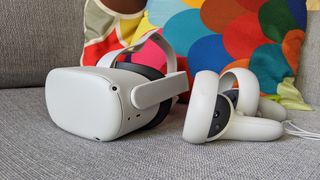Oculus Quest 2 revealed, killing off future Oculus PC VR gear in the process
Say hello to Oculus Quest 2, and bye-bye to the Rift and Rift S

The leaks were real: Oculus Quest 2 is on its way, and is set to offer the most complete standalone VR experience to date.
10% lighter than the first Oculus Quest at 503g and with a 50% sharper LCD screen (1832 x 1920 resolution per eye) than its OLED-based predecessor, it comes with an improved processor (the Qualcomm Snapdragon XR2, which will allow for games and experiences to run at a smooth 90Hz refresh rate), more RAM (up from 4GB to 6GB), controllers with twice the battery life and room for thumb rests, and built-in speakers and hand tracking.
Again, thanks to external sensors, there’s no need for additional tracking stations or PC equipment, with everything powered by the Oculus Quest 2 headset itself. Expect 2-3 hours of battery life, charged over USB-C, depending on the VR software you’re using.
With pre-orders opening today before a wider retail release on October 13, it’ll come in two size variants, a 64GB option priced at $299 / £299 / AU$479, and a 256GB version priced at $399 / $399 / AU$639, making it significantly cheaper than the first model.
- Best VR headsets compared
- What do we know about PS VR 2?
- Best PC games
The end of an era
But the launch of Oculus Quest 2 also marks the end of an era for Oculus, and brings with it some casualties from its line. From here on in, Oculus will be focusing on mobile-centric headsets like the Quest 2, with no intentions to make dedicated PC hardware for the foreseeable future.
That means that last year’s Oculus Rift S will be the last PC-only headset from Oculus for the time being – though Oculus will continue to support the hardware.
Thankfully, thanks to the Oculus Link system, Oculus Quest owners of both hardware generations can still make use of the more impressive experiences being built for PC VR gamers. It’s just a matter of tethering your headset to the PC via a high-speed USB 3.0 cable. But the fear may be that, with the Quest line now the lowest common denominator among Oculus VR gamers, developers may begin to shy away from making experiences that depend on high-end gaming PC equipment, limiting the potential for enhanced VR titles like Asgard’s Wrath and Lone Echo.
Get daily insight, inspiration and deals in your inbox
Sign up for breaking news, reviews, opinion, top tech deals, and more.
But that’s no slight against the Oculus Quest 2, which has made a very impressive debut. You can read our full take in our Oculus Quest 2 review – needless to say, we’re in love with it.
Gerald is Editor-in-Chief of iMore.com. Previously he was the Executive Editor for TechRadar, taking care of the site's home cinema, gaming, smart home, entertainment and audio output. He loves gaming, but don't expect him to play with you unless your console is hooked up to a 4K HDR screen and a 7.1 surround system. Before TechRadar, Gerald was Editor of Gizmodo UK. He is also the author of 'Get Technology: Upgrade Your Future', published by Aurum Press.
Most Popular




